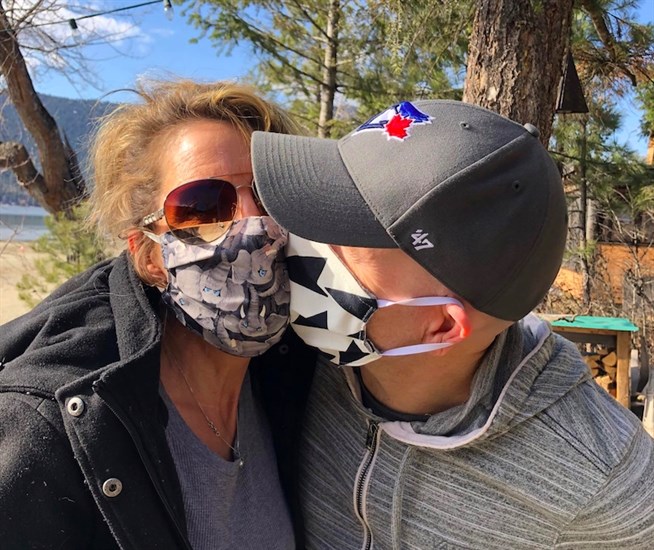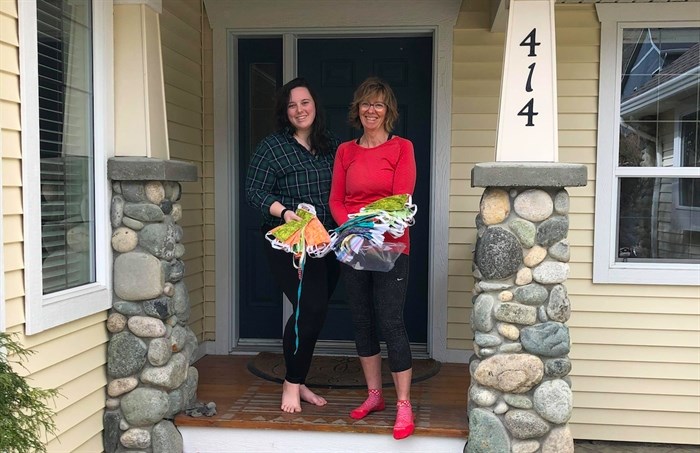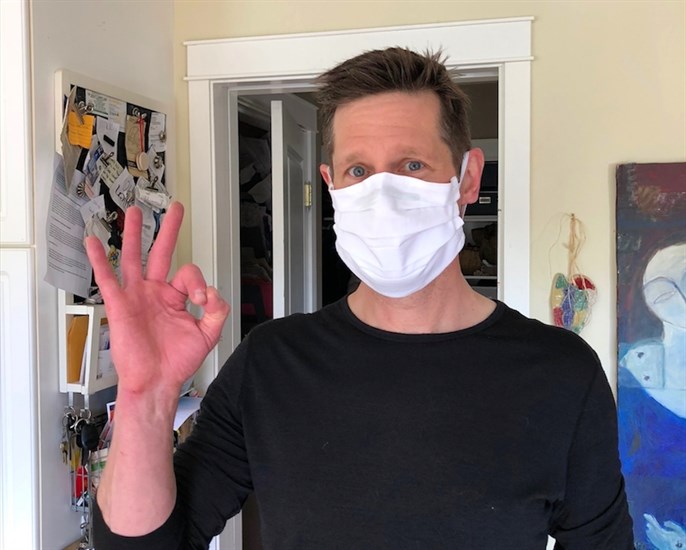
Kamloops locals are pitching by sewing cloth masks for RIH, pharmacies, care homes, and local clinics.
Image Credit: Submitted by Deanna Bell
March 29, 2020 - 7:00 AM
Given the shortage of masks for health care providers, residents throughout Kamloops and Okanagan are pitching in to help out by sewing cloth masks for health care workers.
Throughout the region, people are coordinating through Facebook groups to share patterns and starting to mass produce cloth masks.
Tamara Macpherson Vukusic is coordinating the effort in Kamloops through the Facebook group Sew the Curve Kamloops.
She was inspired to address the mask shortage by her husband, who is a health care worker in the Royal Inland Hospital emergency department.
"I put out a little note on my Facebook page, and the request was for people who sew, if they could give me a hand," said Vukusic. "I had 83 shares within a very short period of time, and so many offers of help."
The group has grown to 393 members in just four days. Members are sharing sewing patterns and supplies such as fabric and elastics with one another, as materials have also been in short supply.
Some have also distributed their own supply of N95 mask they purchased prior to the outbreak, to hospitals and those most at risk.
Problem is, it's unclear at this point how effective or how useful homemade masks will be, or how effective masks are for the general population.
Provincial health officer Dr. Bonnie Henry said for most people, it could increase their risk of contagion.
"In terms of us all wearing masks that is, one, a colossal waste of masks," she said. "We know that people who aren’t ill and are wearing a mask often fiddle with their face and that can be a risk to them self-inoculating and becoming ill."
Essentially, if you're wearing a mask and you're not sick, touching your face when you adjust the mask puts you at more risk. However, if you are sick or in contact with those who are displaying symptoms, a surgical mask is ideal, but a cloth mask is definitely better than no mask at all.
The issue with cloth masks is simply that not a lot of research has been done on their effectiveness, and the findings that are available vary.
Some recent research suggests that both surgical and cloth masks reduce the number of microorganisms expelled by contagious subjects. However, the surgical mask was three times more effective at blocking transmission than the homemade mask.
In light of the current shortage of masks, the CDC does suggest using homemade masks, like a bandana or scarf. However, they caution that those using this option should be cautious, and try to use cloth masks "in combination with a face shield that covers the entire front… and sides of the face."
But finding ways to help health care workers also creates a sense of hope and purpose in those who are stuck at home.
"Everyone feels really helpless right now," explained Vukusic. "It's a way for people to feel like they can help. And they really are."

Community members sewing masks leave them out for pick up, some producing as much as 25 masks a day.
Image Credit: Submitted by Tamara Macpherson Vukusic
The Kamloops Hospice reached out to Sew the Curve requesting masks, so Vukusic delivered 22 masks to them March 26. She has also received requests from Overlander Residential Care, nurses and other local care facilities as well.
The group also provided five masks to a new mother who was nervous about nursing, as she was experiencing COVID-like symptoms.
Vukusic was contacted by Thompson Tailors in Kamloops. They have offered their professional services to produce one thousand cloth masks a day for the group to distribute.
Members of the group are getting innovative with design, trying to make the masks as effective as possible. One design includes pipe cleaners that fit tightly around the nose.
"My husband has tried on a number of the prototypes, and he's just amazed at how well they fit, how breathable they are, but how solid they feel," said Vukusic.

Vukusic's husband, a front-line health care worker at RIH, tries on the masks to see what fits best.
Image Credit: Submitted by Tamara Macpherson Vukusic
Another solution is to wear the cloth mask over the surgical N95 mask in order to make it last longer.
One of the group's members with experience making masks for hazmat suits created design for a cloth mask that fits over the N95 mask.
"It increases filtration, but it also safeguards your N95 mask," explained Vukusic. "That's one of the top two recommended masks for a hospital setting."
The group has produced just over 100 masks so far, and their goal is to make and distribute ten thousand.
Other mask sewing groups are starting to pop up across the Okanagan, like Medical Mask Making Okanagan, and locals are rallying to either make masks or find N95 masks to donate.
To contact a reporter for this story, email Brie Welton or call (250) 819-3723 or email the editor. You can also submit photos, videos or news tips to the newsroom and be entered to win a monthly prize draw.
We welcome your comments and opinions on our stories but play nice. We won't censor or delete comments unless they contain off-topic statements or links, unnecessary vulgarity, false facts, spam or obviously fake profiles. If you have any concerns about what you see in comments, email the editor in the link above.
News from © iNFOnews, 2020